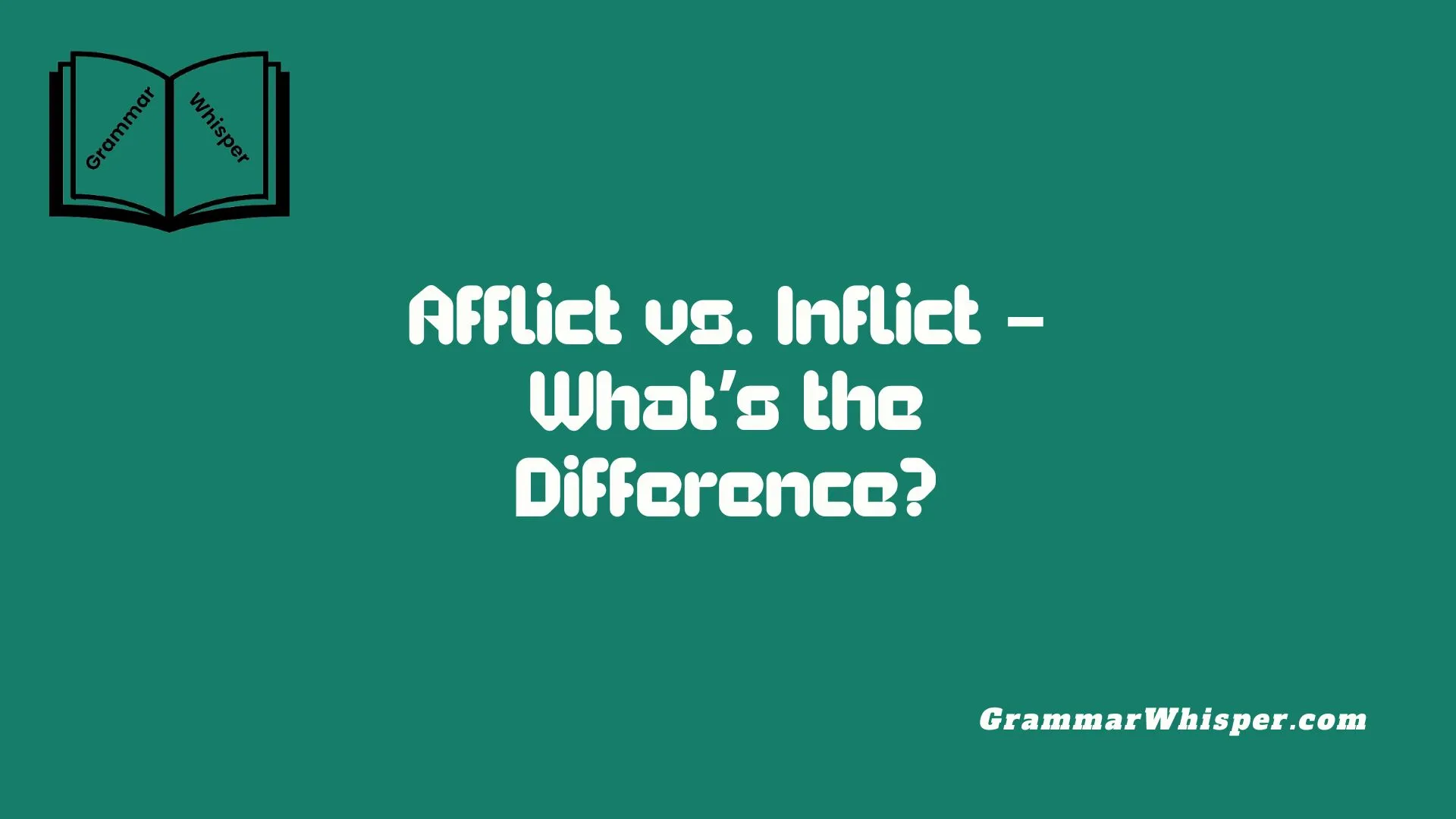In my editorial work, I’ve seen how writers often confuse similar terms like afflict and inflict. At first glance, they may seem interchangeable, but in reality, they have distinct meanings and carry heavy emotional weights. This subtle difference truly matters when you’re trying to write clearly and precisely. I once stumbled over a sentence where a small trip in word choice completely changed the intended message. A single word can shift the tone of an entire sentence, which is why using the correct one is so important.
Both words have deep Latin roots and serve different grammatical roles. Afflict is generally passive – it refers to something bad like diseases or hardships that happens to someone. Inflict, on the other hand, is active and intentional, such as when someone causes harm, punishment, or damage. These differences might seem academic, but they are vital for strong communication. In my work, I often bring in examples, tables, and contextual comparisons to clarify usage. Once you understand the insights, you’ll realize these words aren’t interchangeable – your language becomes more precise and far more powerful.
Why “Afflict vs. Inflict” Confuses So Many People
These two verbs come from the same Latin root: fligere, which means “to strike”. That explains why they sound similar and both involve some kind of harm or damage. But here’s where it gets tricky:
- “Afflict” refers to suffering experienced by someone.
- “Inflict” refers to harm that is imposed or caused by someone.
They’re like two sides of the same coin: one is the receiver of pain, the other the giver.
Let’s dig into how they’re used, where the confusion lies, and how to remember the difference forever.
The Root of the Confusion: Understanding “-flict”
Both words stem from Latin:
- Affligere → To knock down or crush
- Infligere → To strike or dash against
These evolved into:
- Afflict = To cause mental or physical suffering
- Inflict = To impose something unpleasant or painful
The confusion starts because both involve some kind of damage, but the agent and recipient roles are completely reversed.
“Affliction is what you feel. Infliction is what you do.”
What Does “Afflict” Really Mean?
Afflict is about experiencing pain or suffering, often as a result of forces beyond your control. It typically appears in medical, emotional, or societal contexts.
Definition:
To cause persistent pain or suffering to; to distress severely.
Examples of Usage:
- “She was afflicted with arthritis for years.”
- “The region was afflicted by drought and famine.”
- “Guilt afflicted him long after the event.”
Common Themes:
- Illness
- Poverty
- Mental distress
- Guilt or emotional trauma
Synonyms of “Afflict”
| Word | Context of Use |
| Plague | Often used metaphorically or biblically |
| Torment | Usually mental or emotional suffering |
| Trouble | General term, less intense |
| Oppress | Often used in a political or societal sense |
| Burden | Mental or physical load |
Common Phrases:
- Afflicted with a disease
- Afflicted by sorrow
- Afflicted nations
These phrases usually focus on what someone goes through, not what they cause.
Understanding “Inflict” and Its Forceful Tone
Where “afflict” is about receiving suffering, “inflict” is about causing it.
Definition:
To impose something unpleasant or painful on someone or something.
It’s more aggressive, more active, and often intentional. You don’t just “inflict” by accident.
Examples of Usage:
- “The torturer inflicted terrible pain on his captives.”
- “The dictator inflicted suffering on his people.”
- “She inflicted emotional wounds that never healed.”
Synonyms of “Inflict”
| Word | Meaning |
| Impose | Usually used in legal or moral contexts |
| Deliver | Can be used metaphorically (e.g., blow) |
| Administer | Often used for punishment or medicine |
| Wreak | Often seen in phrases like “wreak havoc” |
| Deal | Used in phrases like “deal a blow” |
Common Phrases:
- Inflict punishment
- Inflict harm/damage/pain
- Inflict suffering on innocent people
The agent is the doer. They’re the source of the action.
Afflict vs. Inflict: Core Differences Simplified
Here’s a handy table to make the distinction stick:
| Feature | Afflict | Inflict |
| Nature of Action | Passive (experienced) | Active (caused or done) |
| Direction | Suffering received | Pain or damage imposed |
| Common Subjects | Disease, guilt, sorrow | Person, law, force |
| Voice | Often passive | Usually active |
| Context | Medical, emotional, societal | War, law, punishment |
| Sample Use | “She was afflicted with grief.” | “He inflicted grief on her.” |
Tip to remember: If someone is hurt, they’re afflicted. If someone hurts another, they inflict.
How Passive Voice Affects Their Use
Interestingly, “afflict” is often used in the passive voice, because the subject is usually not in control of their pain:
- “She was afflicted by loneliness.”
In contrast, “inflict” is generally used in the active voice:
- “The government inflicted harsh penalties.”
But sometimes, passive voice is used for “inflict” when the doer is either unknown or unimportant:
- “Pain was inflicted during the interrogation.”
Still, active voice is clearer, punchier, and more engaging. So use it when you can.
Emotional vs. Physical Harm: A Key Contextual Difference
| Type of Harm | Afflict Example | Inflict Example |
| Emotional | “He was afflicted by guilt.” | “She inflicted emotional abuse.” |
| Physical | “She was afflicted with a chronic illness.” | “They inflicted bodily harm.” |
| Social/Political | “The nation was afflicted by inequality.” | “The regime inflicted censorship.” |
“Afflict” often implies involuntary, long-term suffering. “Inflict” implies a deliberate act of harm, sometimes sudden.
Real-World Examples of “Afflict” in Context
Medicine:
- “Over 38 million people are afflicted with HIV globally.” (Source: UNAIDS)
Mental Health:
- “Depression continues to afflict millions, especially post-pandemic.”
Environment:
- “Severe droughts afflict the Horn of Africa every few years.”
These examples show how “afflict” applies to large groups, long-term issues, and emotional or systemic problems.
Real-World Examples of “Inflict” in Action
War and Politics:
- “The Russian invasion inflicted heavy casualties.”
- “Authoritarian regimes inflict censorship on dissenters.”
Law and Justice:
- “The court inflicted the maximum penalty.”
- “The suspect inflicted harm with malicious intent.”
Domestic and Personal Conflicts:
- “Verbal abuse can inflict invisible wounds.”
Unlike “afflict,” this word almost always paints the subject as aggressive or controlling.
Common Mistakes: How Writers Get It Wrong
Writers often swap these words because they both involve pain. But remember: the difference is all about agency.
Incorrect vs. Correct Usage Table
| Incorrect Sentence | Why It’s Wrong | Correct Sentence |
| “The disease inflicted the population.” | Disease doesn’t inflict – it afflicts | “The disease afflicted the population.” |
| “He afflicted pain on others.” | People don’t afflict pain – they inflict | “He inflicted pain on others.” |
| “She was inflicted with sorrow.” | Sorrow doesn’t get inflicted on you | “She was afflicted with sorrow.” |
| “He was afflicted punishment.” | Punishment is inflicted, not afflicted | “He was inflicted with punishment.” (Better: “They inflicted punishment on him.”) |
Tips to Never Mix Up “Afflict” and “Inflict” Again
- Think about agency. Who is doing what to whom?
- Use a memory aid:
- Afflicted = Affected (by pain)
- Inflicted = Initiated (pain)
- Practice with real scenarios:
- “My friend was afflicted with migraines.”
- “Loud music inflicted stress on the neighbors.”
Final Thoughts
Understanding the difference between “afflict” and “inflict” isn’t just about grammar – it’s about precision in communication. These two words may sound similar, but they live on opposite sides of an emotional and grammatical spectrum. One describes suffering endured; the other, harm imposed.
So whether you’re drafting an essay, scripting a news piece, or simply improving your vocabulary, remembering the subtle but sharp line between these two verbs can elevate your expression and deepen your impact.
FAQs
What’s the simplest way to remember the difference between afflict and inflict?
Think of “afflict” as what someone experiences, and “inflict” as what someone does to cause pain. Affliction = suffering received. Infliction = suffering given.
Can a person be both afflicted and inflict pain at the same time?
Yes, in complex situations, a person may be afflicted by one issue (like trauma) and inflict pain on others due to that trauma. It’s common in psychological or social contexts.
Why is “afflict” often seen in medical or emotional contexts?
Because “afflict” refers to ongoing suffering that someone experiences – like disease, anxiety, or poverty – it naturally fits emotional, physical, and chronic conditions.
Is “inflict” always intentional?
Usually, yes. “Inflict” often implies deliberate action or intent to harm, as in legal or military use. However, it can sometimes be unintentional but still active in nature.
Do these words change in meaning when used in passive voice?
Not really – their core meanings stay the same. But the tone and focus shift. “Afflicted” in passive shows the person suffering. “Inflicted” in passive puts focus on the harm rather than the agent.











